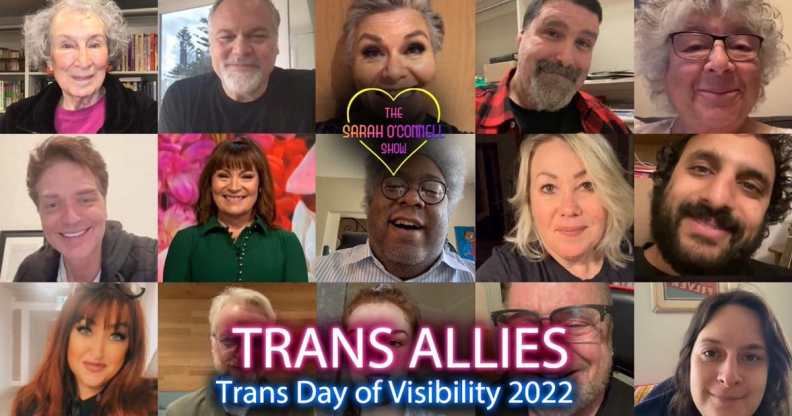Trans Day of Visibility: Lilly Wachowski and Margaret Atwood lead celebrations in moving videos

Trans allies compilation video by Sarah O’Connell (YouTube)
Lilly Wachowski, Hope Giselle, Margaret Atwood, Miriam Margolyes and more star in a powerful pair of videos that mark Trans Day of Visibility.
March 31 is Trans Day of Visibility – a day of focus, love and support for trans people and issues. One in which our community actively stands defiant and visible against all of those who would much rather us be neither seen nor heard. There are various events, activities and calls to action led by trans people all with the aim of supporting the community.
One such trans woman seizing the moment is Sarah O’Connell, whose namesake YouTube show runs all year round featuring in-depth celebrity interviews, including huge Hollywood names such as Keanu Reeves, Tom Cruise and Jada Pinkett Smith.
Not content with making her own mark, Sarah ropes in her celebrity guests each year to shine a light on Trans Day of Visibility. In years past, the likes of Stephen Fry, Rosanna Arquette, Lou Diamond Phillips, Nigella Lawson and Ben Stiller have taken part, sharing why they are committed to being trans allies.
This year’s video is her biggest yet with double the celebrity guests of the original 2020 outing, including the likes of Margaret Atwood, Dawn French, Miriam Margolyes, Lorraine Kelly, Nish Kumar and Vincent D’Onofrio.
Most importantly, Sarah has also given members of the trans community space to speak about what visibility means to them and why it’s important. This year, she called upon Matrix creator Lilly Wachowski, Hope Giselle (star of I Am Jazz), Cassie Workman, Caelan Conrad, Amanda Jetté Knox, LaSaia Wade and more.
Both are heartfelt projects providing some desperately needed positivity. The current media landscape is less than friendly towards trans lives as publications continue to amp up the anti-trans rhetoric. Sarah’s projects cut through that noise and give us something simply lovely.
Sarah told PinkNews that the point of her videos is to educate, to “show that it’s easy to be an ally, and also act like a sort of virtual hug for the trans community to let them know that lots of people do care about them.”
It’s important work which is necessary, because as Sarah says, “you rarely ever get to hear trans people tell their own stories, share their experiences, work, worries or discuss matters that actually affect their lives in the media” with publications more keen to “relentlessly platform transphobes every day in print, radio and on television”.
“It’s easy to forget that there’s a lot of trans allies out there,” Sarah adds, and her work not only aims to change that perception but also bring people closer together.

